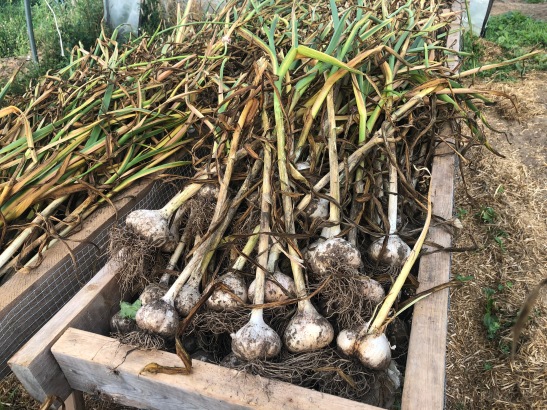Allium Time
One of the fascinating features of farming is its dynamism in rhythm throughout the season. Gentle, housebound planning sessions of winter are supplanted by the greenhouse world of seeds, trays and watering patterns, which transition into field prep, broadfork beasting, transplanting and bucket dogging. From there stem the critical phases of weed management, followed by the extended blitz of succession plantings and intensive harvest days. Gradually, the nature of harvest changes as long-season crops become available for bulk harvest, and then priorities shift to cover cropping, winter crop establishment, and management of food storage. You never quite perceive the change until you’re well into the swing of a new rhythm.
Our latest transition has been a step into allium time. When Oren informed me that it was time to harvest onions and garlic, I flashed back, somewhat negatively, to last season, in which onion harvest signified quite clearly the beginning of our collective slowdown, when exhaustion overtook our bodies as we spent weeks searching out and digging onions from the depths of a sea of 6’ weeds. We are certainly not in any way ready for a slowdown, and given my lived experience with this rhythmic nature, I was none too keen on harvesting onions.

But if it’s time, then it’s time. So, Wednesday morning, with only a handful of us on-site, we finished digging the last three beds of our beautiful garlic bulbs before turning our attention to onion harvest. By now we had a couple of workshares. Tracing my memory again to the season prior, I readied the wagon and prepared for the endless slog. But something was different. Time slowed to a crawl during the hours of those workshares’ shifts, and infinity opened up within those onion plots. I called Oren at some point, to inquire about the fate of the plot, post-harvest. Should we cover crop or mulch after we mow?

Are you really going to finish a plot? He asked. That would also mean getting the onions put away, pulling all the drip tape, etc. etc. I looked out at Ed, Corrina, Katherine and Ashley, and the furious pace we were keeping. Yeah man, I think we can do it.
We did. Not only did we get the onions put away and drip tape removed, we started on a second plot. By the time the workshares left, we were over halfway through, so Red, Corrina and I decided to keep our momentum going and just finish it up. And we did; drip tape and all. I almost couldn’t believe it. As the sun finally set on our endless allium day, I ran the BCS mower over the emptied plots; taking down the tall weeds, to prepare for cover cropping or sheet mulching – in essence, putting them to bed for winter. Two thirds of our onions; harvested in a single day with a small crew.

All this brings to mind another fascinating feature of farming, which is the odd and ironic warping of priorities in light of the constant state of grind. At some point in the habitual wheel of succession planting and weed management, harvest actually becomes burdensome. For the months of work leading up to those precious moments of picking food from land, it’s nearly impossible not to think ahead to the next crop; the next task; the next season. Thursday morning, for the second straight week, Danny and I found ourselves lamenting the tediousness of zucchini and cucumber harvest. Why does this take so long? Doesn’t nature know we have more important things to be working on?
We discussed the fate of our trailer full of onions remaining to be bunched and hung to dry. Yeah, that would be nice to finish, but we need to plant for late fall and winter. Thankfully we came to our senses and took care of the onions we’ve taken so much to care for until now. One day piled on the stuffy trailer becomes one week, which eventually becomes a trailer full of rotting onions.
At its climax, this tendency towards future prioritization over present harvest manifests in the diet of the farmers themselves. I’ve known many a farmer to work tirelessly on the establishment and growth of food of the highest quality, only to subsist themselves on cheap convenience foods, given cost and time constraints. I’m trying to break this cycle within myself, through a mental recalibration of sorts. When it’s time to harvest and preserve a seeming overabundance of cucumbers and zucchini, it’s time to harvest and preserve. When it’s allium time, it’s allium time. If not, then what the hell are we doing here in the first place?
